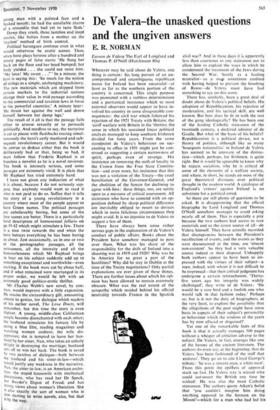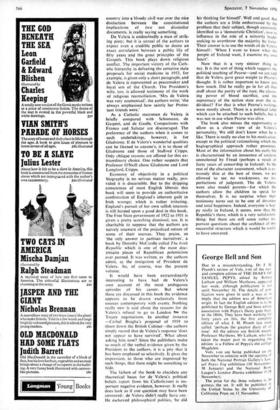De Valera-the unasked questions and the ungiven answers
E. R. NORMAN
Eamon de Valera The Earl of Longford and Thomas P. O'Neill (Hutchinson 80s)
Whatever may be said about de Valera, one thing is certain: his long pursuit of an an- compromised and unambiguous republican status for Ireland has been successful—at least as far as the southern portion of the country is concerned. This single purpose was promoted with a ruthless determination and a puritanical insistence which to most external observers would appear to have in- volved his country in some disagreeable con- sequences: the civil war which followed his rejection of the 1921 Treaty with Britain; the tariff warfare with Britain in the 'thirties; the sense in which his sustained linear political analysis managed to keep southern Irishmen divided for forty years. From the same standpoint de Valera's behaviour on suc- ceeding to office in 1931 might just be con- strued as suggesting a certain narrowness of spirit, perhaps even of revenge. His insistence on removing the oath of loyalty to the Crown from the Free State Constitu- tion—and even more, his insistence that this was not a violation of the Treaty—the cruel humiliation of the Governor-General, and the abolition of the Senate for declining to agree with him: these things, too, are surely open to a measure of critical assessment. All statesmen who have to contend with an op- position defined by sharp political difference are inevitably obliged to resort to devices which in more felicitous circumstances they might avoid. It is no injustice to de Valera to suggest a few of them.
There have always been some rather serious gaps in the explanation of de Valera's conduct of public affairs. Books about the President have somehow managed to pass over them. What was his share of the responsibility for the drift of Ireland into a shooting war in 1919 and 1920? Why was he in Afnerica for so great a part of the hostilities? Why did he stay in Dublin at the time of the Treaty negotiations? Only partial explanations are ever given of these things. There are further issues about which his opi- nion has been allowed to remain extremely obscure. What was the real extent of the sympathy which resided behind his official neutrality towards Franco in the Spanish
civil war? And in these days it is apparently less than courteous to any statesman not to allow him to explain the ways in which he condemned the treatment of the Jews during the Second War. Surely as a leading neutralist—as a map sometimes credited with having helped to prevent the bombing of Rome—de Valera must have had something to say on this score.
There has, similarly, been a great deal of doubt about de Valera's political beliefs. His adoption of Republicanism, his rejection of moderation, and his tactical skill, are well known. But how does he fit in with the rest of the gang ideologically? He has been one of the leading Catholic statesmen of the twentieth century, a declared admirer of de Gaulle. But what of the basis of his beliefs? Republicanism is a political device, not a theory of politics, although like so many 'bourgeois nationalists' in Ireland de Valera has seemed to be unaware of the distinc- tion—which, perhaps, for Irishmen, is quite right. But it would be agreeable to know why he rejects socialism, why he is critical of some of the elements of a welfare society, and where, in short, he stands on most of the great theoretical divisions over political thought in the modern world. A catalogue of England's 'crimes' against Ireland is no substitute for a political creed.
So there are still plenty of questions to be asked. It is disappointing that the official biography by Lord Longford and Thomas O'Neill somehow manages to avoid asking nearly all of them. This is especially a pity because the two authors had access to rare materials and to the rarest source of all—de Valera himself. They have actually recorded that discrepancies between the President's recollection of events, and the events as they were documented at the time, are 'almost non-existent'. So they had a very valuable source indeed at their disposal. Unhappily both authors appear to have been so im- pressed with the virtues of their subject—a man, indeed, with whom it is not difficult to be impressed—that their critical judgment has undergone a certain retrenchment. 'Thirty- five years ago his integrity was widely challenged', they write of de Valera: 'He would be a rare bird and a foolish one who would talk in that fashion today.' Perhaps so; but is it not the duty of biographers, at the very least, to explore the possibility that the allegations of the past might have some basis in aspects of their subject's personality or behaviour which the wisdom of the years has by now effaced or disguised?
Yet one of the remarkable feats of this book is that it actually manages 500 pages without a whisper of criticism adverse to the subject. De Valera, in fact, emerges like one of the heroes of the ancient literature. The authors do even say, at the beginning, that de Valera 'has been fashionea of the stuff that endures'. They go on to cite Lloyd George's tribute: 'he was a sincere man, a white man'. From this point the epithets of approval stack up fast. De Valera was 'a wizard who could out-smart the British any time he wished'. He was also the most Catholic statesman. The authors quote Aiken's beliet that 'you couldn't imagine him doing anything opposed to the Sermon on the Mount'—which for a man who had led his country into a bloody civil war over the nice distinction between the constitutional implications of two not dissimilar documents, is really saying something.
De Valera is undoubtedly a man of strik- ing piety; but it is unreal of the authors to expect even a credible public to desire an exact correlation between a public life of fifty years and the great principles of the Gospels. This book plays down religious conflict. The important victory of the Cath- olic hierarchy in defeating the tentative state proposals for social medicine in 1953, for example, is given only a short paragraph, and de Valera is represented as peacemaker and loyal son of the Church. The President's wife, too, is allowed testimony of the work of religious reconciliation. 'Mrs de Valera was very ecumenical', the authors write; 'she always emphasised how saintly her Protes- tant friends were.'
As a Catholic statesman de Valera is briefly compared with Schumann, de Gasperi, and de Gaulle. Comparisons with Franco and Salazar are discouraged. The preference of the authors when it comes to such undertakings, however, is for Gladstone. If de Valera's wonderful qualities can be likened to anyone's, it is to those of Gladstone and those of Stafford Cripps. Only oblique reasons are offered for this ex- traordinary choice. One rather suspects that Professor O'Neill chose Gladstone and Lord Longford, Cripps.
Economy of objectivity in a political biography is no serious matter really, pro- vided it is discernible. But to the dripping consciences of most English liberals this book will seem to provide an authoritative confirmation of England's inherent guilt in Irish wrongs; which is rather irritating. England's pursuit of her own selfish interests is still harped upon a good deal in this book. The Free State government of 1922 to 1931 is given a pretty scorching dismissal, too. It is charitable to suppose that the authors are naively unaware of the prejudiced nature of some of their sources. They praise, as 'the only answer to partisan narratives', a book by Dorothy McCardle called The Irish Republic which is one of the most doc- trinaire pieces of Republican polemicism ever penned. It was written, as the authors admit, at the instigation of President de Valera. So, of course, was the present volume.
It would have been extraordinarily interesting to have had de Valera's own account of the most ambiguous episodes of his career. But where these are discussed in 'this book the evidence appears to be drawn exclusively from sources contemporary with events. Nothing really new is said about the reasons for de Valera's refusal to go to London for the Treaty negotiations. In another instance —Cathal Brugha's proposal of 1919 to shoot down the British Cabinet—the authors simply record that de Valera's response 'does not appear to have survived'. What about asking him now? Since the publishers make
so much of the verbal evidence given by the President to the authors, it is a pity that it has been employed so selectively. It gives the impression, to those who are impressed by such things, that there might be something to hide.
The failure of the book to elucidate any theoretical bases for de Valera's political beliefs (apart from his Catholicism) is im- portant negative evidence, however. It really does look as if one question may have been answered : de Valera didn't really have any. He eschewed philosophical politics, 'he did
his thinking for himself'. Well and good. But the authors are a little embarrassed by the problem that their subject, though cautiously identified as a 'democratic Christian', rose to influence in the role of a minority leader seeking to overthrow the majority by force. Their answer is to use the words of de Valera himself: 'When I want to know what the people of Ireland want, I examine my own heart'.
Now that is a very sinister thing to say. It is the sort of thing which suggests the political teaching of Pearse—and we are told that de Valera gave great weight to Pearse's thought. It is rather important to know just how much. Did he really go in for all that stuff about the purity of the race, the cleans- ing power of blood sacrifice, and the supremacy of the nation state over the in- dividual? For that is what Pearse's writings were mostly about. There is a political label which can be attached to such beliefs, but it was not in use when Pearse was alive.
The book also misses the opportunity to allow us a closer view of de Valera's personality. We still don't know what he is like. There is really no clue to his motivation. except in the political rationalising which the hagiographical approach rather promotes. Most of the information about his early life is characterised by an innocence of analysis unmolested by Freud (perhaps a result of forty years of censorship in Ireland). In the rest of the character assessment, which is ex- tremely thin at the best of times, we are allowed to see no weaknesses, no im- perfections of judgment. The de Valetas were also model parents—for which the authors allow the children to speak for themselves. It is no surprise when their testimony turns out to be one of devotion and total happiness. Indeed, everyone is hap- py really in Ireland, it seems, now that the Republic's there, which is a very satisfactory thing; but there are still some rather im- portant questions about the architect of this successful structure which it would be useful to have answered.























































 Previous page
Previous page